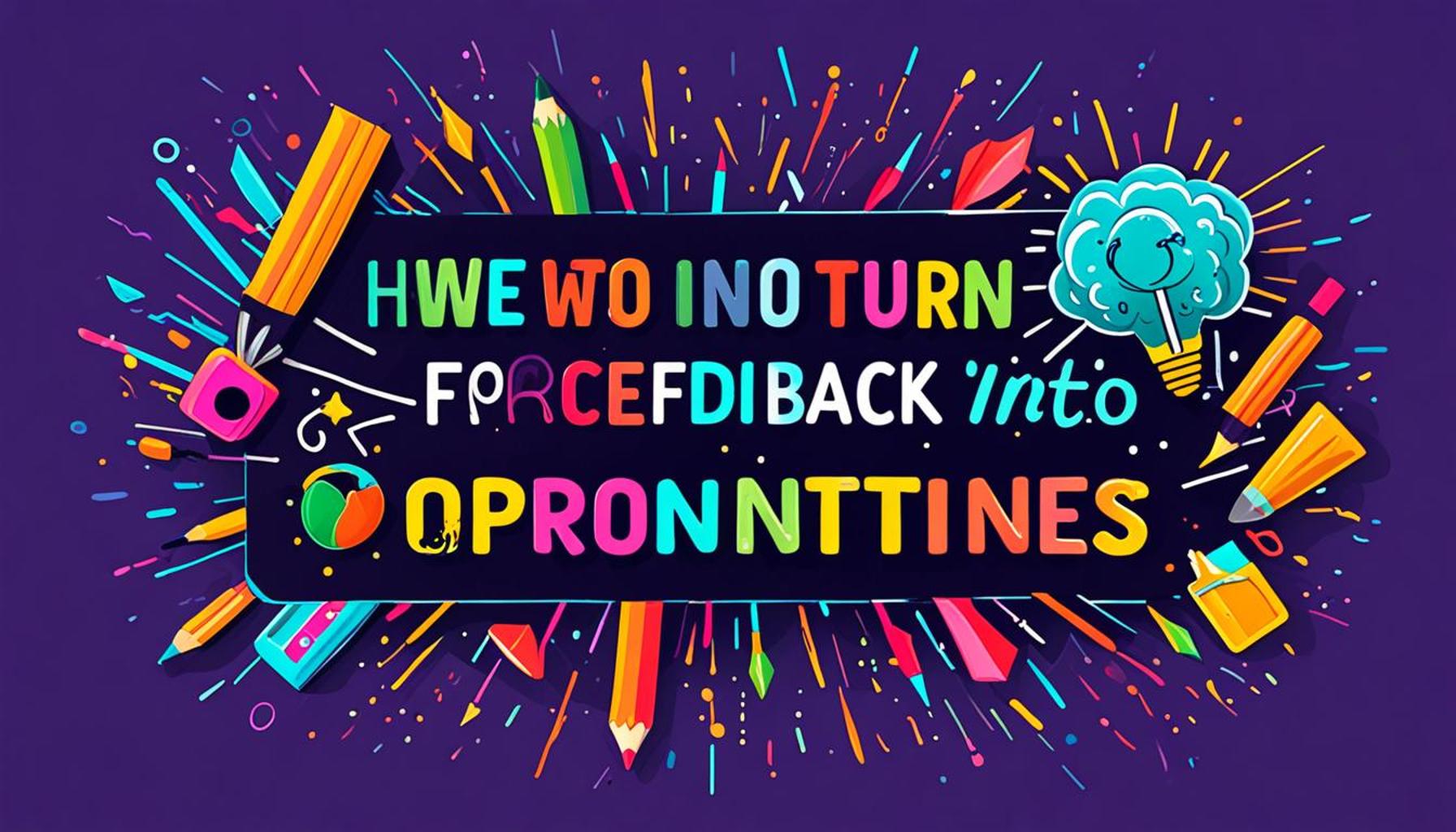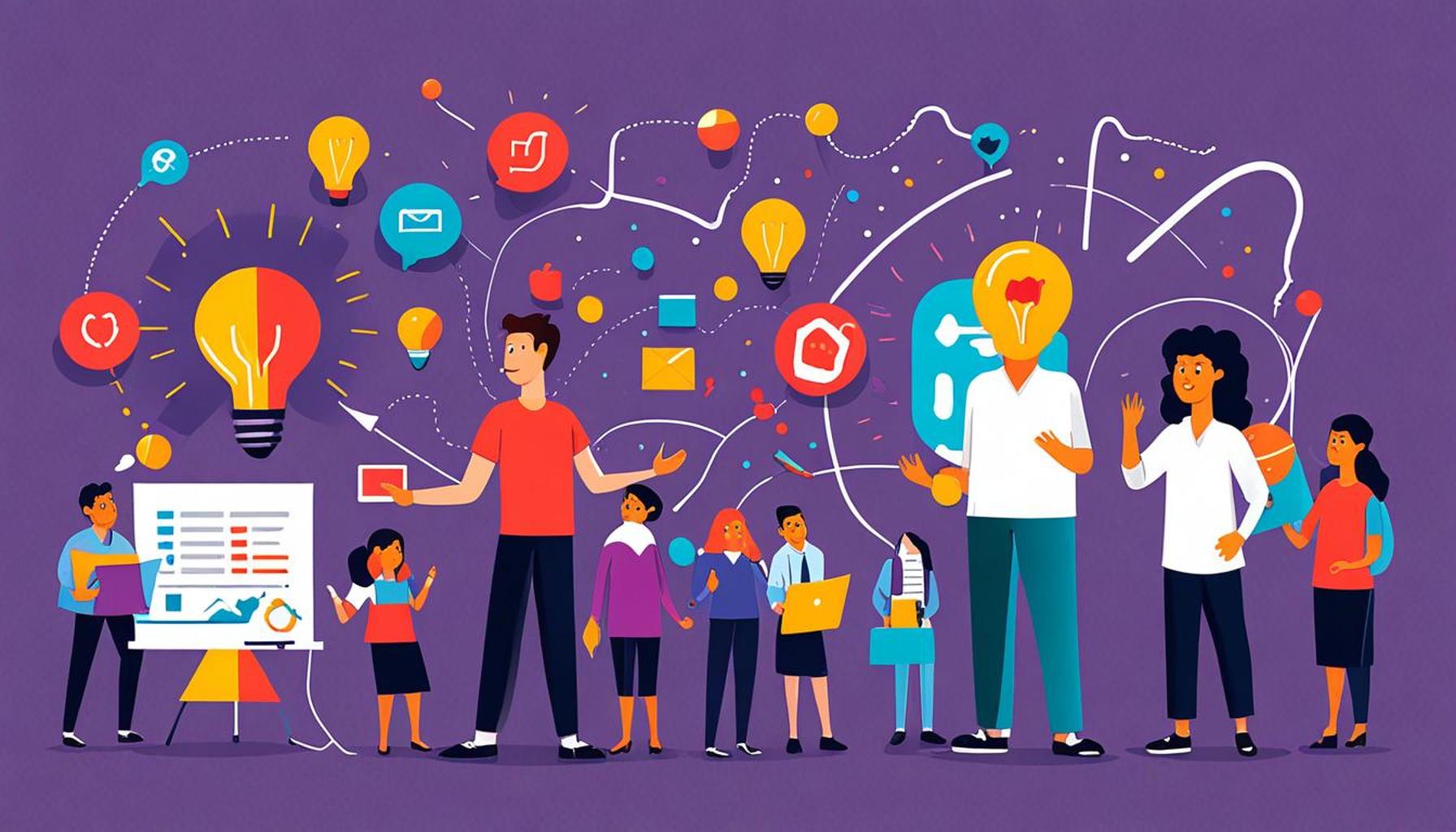The Importance of Feedback in Building a Growth Mindset

The Transformative Power of Feedback in Personal and Professional Growth
Feedback is an essential element in the journey of growth, often acting as a powerful compass that guides individuals toward self-improvement and success. It provides insight, not only revealing our strengths but also illuminating areas that require attention. This reflective process is especially crucial in nurturing a growth mindset, a term popularized by psychologist Carol Dweck that emphasizes the belief that abilities can be developed through dedication and hard work.
Unlike simple criticism, feedback is a constructive dialogue — a chance for transformation and learning. It opens the door to new ideas and perspectives that can significantly impact personal and professional trajectories. Here are a few key ways feedback fosters a growth-oriented environment:
- Encourages self-awareness: Through feedback, individuals gain clarity on how their actions are viewed by others. For instance, a teacher noting a student’s exceptional analytical skills can reinforce that student’s confidence, while also pointing out areas that need improvement can help them focus their efforts. This dual insight fosters a stronger sense of self-efficacy.
- Drives motivation: Positive reinforcement can serve as a catalyst for enthusiasm. When Nigerian artisans receive praise for their craftsmanship, it kindles a passion to innovate or perfect their skills, whether in weaving beautiful traditional fabrics or creating vibrant art pieces. This motivation can lead to further development and creativity in their work.
- Promotes resilience: Constructive feedback teaches individuals to embrace challenges rather than shy away from them. For example, in the competitive Nigerian tech startup scene, feedback often revolves around product functionality and user experience. Entrepreneurs learn that constructive criticism can bolster their resilience, allowing them to pivot and adapt their offerings effectively.
In Nigeria, where the spirit of hustle and continual improvement thrives, incorporating feedback into daily routines can greatly enhance performance across various fields, including education, business, and local craftsmanship. For example, workshops designed to provide peer feedback among teachers can result in improved teaching methodologies and student outcomes. Similarly, small businesses that actively seek customer feedback create a loop of continuous improvement, leading to increased customer satisfaction and loyalty.
By actively embracing constructive criticism and valuing diverse input from colleagues and mentors, individuals can unlock their full potential and pave the way toward innovation and achievement. The critical question then becomes: how can we further harness the power of feedback to cultivate a robust culture of growth in our communities?
The journey towards growth through feedback is a collective endeavor. As Nigerians, fostering environments that celebrate open dialogue and constructive evaluation is not only beneficial but necessary to thrive in an increasingly competitive world.
ADDITIONAL INSIGHTS: Expand your understanding here
Understanding Feedback: A Catalyst for Growth
In the unfolding narrative of personal and professional development, feedback emerges as a pivotal force that transcends mere evaluation; it acts as an essential building block for a growth mindset. Recognizing feedback as a source of learning equips individuals with the resilience and adaptability required to navigate the complexities of modern life, particularly in a dynamic environment like Nigeria, where the drive for innovation and improvement is deeply rooted.
One of the most compelling aspects of feedback is its ability to foster self-awareness. When individuals receive input regarding their performance or behavior, they gain valuable insights into how their actions are perceived by others. This self-awareness is crucial in a society that values communal relationships, as it allows individuals to align their personal goals with the expectations and needs of their community. For example, a young entrepreneur in Lagos may learn from customer feedback that their service lacks efficiency. This constructive critique not only highlights a weakness but also provides an opportunity for growth, steering them toward refining their approach and ultimately enhancing the customer experience.
Moreover, feedback propels motivation. It can act as a spark that ignites the drive for achievement, especially in culturally rich environments like Nigeria, where accolades for craftsmanship and innovation can uplift entire communities. For instance, artisans in regions renowned for their beadwork often rely on feedback from their clients to hone their craft. When their handmade jewelry receives praise for its ingenuity, it boosts their morale and inspires them to explore new designs, fostering a cycle of creativity and excellence.
The interplay of positive reinforcement and constructive criticism also cultivates resilience. In volatile sectors, such as technology and startups, entrepreneurs must embrace feedback to survive. Nigerian tech innovators often face a barrage of critiques regarding their apps or platforms. However, rather than being deterred, these criticisms can galvanize them to iterate and improve their offerings. This resilience is integral to success, as it empowers individuals and organizations to adapt swiftly to shifting market demands while reinforcing a mindset rooted in continued learning.
- Increased confidence: Constructive feedback enables individuals to recognize and leverage their strengths, boosting their confidence to take on new challenges.
- Enhanced skills: By understanding areas that require improvement, individuals can focus their learning efforts, leading to skill enhancement.
- Stronger relationships: Feedback can foster open communication among peers, strengthening collaborative efforts in both personal and professional settings.
In Nigeria, where collective progress is often tied to individual advancement, embracing feedback can significantly influence various sectors, from education to entrepreneurship. By creating feedback loops in learning environments or businesses, communities can engage in continuous growth and elevate standards. The essence of feedback lies not only in its delivery but also in the willingness of individuals to receive and act upon it, making it an invaluable tool in shaping a growth-oriented future.
The Importance of Feedback in Building a Growth Mindset
Feedback is not just a tool for assessment; it’s a vital component in fostering a growth mindset. Understanding how and why feedback matters can enhance personal development, whether in educational settings or professional environments. In this segment, we delve into how effective feedback contributes to resilience, adaptability, and ultimately, growth.One of the key roles of feedback is its capacity to instill a sense of resilience in individuals. When constructive feedback is provided, it helps individuals recognize areas needing improvement without demoralizing them. This alteration in perception is essential for abandoning the notion of fixed abilities. Instead of seeing a challenge as a threat, individuals can view it as an opportunity for growth. For example, when a student receives feedback on a project, rather than feeling defeated, they can use it to refine their skills in future assignments.Furthermore, feedback encourages adaptability, which is crucial in both personal and professional landscapes. With regular insights into their performance, individuals can make necessary adjustments, thus aligning their efforts with their goals. This frequent recalibration is often vital in fast-paced environments where change is the norm. Studies have shown that organizations with a culture of open feedback report higher employee satisfaction and agility in adapting to new challenges.Lastly, the ability to critically analyze feedback can enhance decision-making skills. By learning to interpret feedback constructively, individuals can develop a keen sense of self-awareness. This self-awareness fosters better relationships, teamwork, and collaboration in various settings. Thus, the practice of giving and receiving feedback becomes a profound driver of not only personal growth but also collective advancement.To illustrate how impactful feedback can be in the context of a growth mindset, consider the role of mentorship. Mentors often use feedback as a vehicle to guide mentees toward their full potential, showcasing how an open exchange can lead to breakthrough moments in personal and professional development. In summary, feedback serves as the backbone of fostering a growth mindset. By embracing it, individuals can cultivate resilience, adaptability, and critical thinking skills – attributes that are indispensable in today’s world.
| Category 1 | Category 2 |
|---|---|
| Resilience | Feedback helps individuals view challenges as opportunities for improvement. |
| Adaptability | Frequent feedback leads to timely adjustments aligned with personal or professional goals. |
ADDITIONAL INSIGHTS: Expand your understanding here
Transforming Feedback into Action
The journey from receiving feedback to realizing its benefits is one that requires intentionality and commitment. In the Nigerian context, where communal ties play a significant role in personal development, individuals must learn to transform feedback into actionable steps. This transformation is paramount in fostering a culture of continuous improvement and innovation. For instance, in educational settings, teachers who actively solicit feedback from students not only gauge their effectiveness but also create an environment where students feel valued. This, in turn, encourages more open dialogue and engagement, leading to a richer learning experience.
Incorporating feedback into personal and professional practices involves the implementation of iterative processes. Take, for example, the booming success of tech hubs in cities like Yaba and Abuja. Entrepreneurs in these dynamic spaces often rely on feedback loops that allow them to refine their products based on user insights. Utilizing agile methodologies, tech startups frequently release beta versions of their applications to gather user opinions, quickly adapting their designs based on this feedback. This practice not only accelerates product development but also enhances user satisfaction, a crucial factor in today’s competitive landscape.
Another aspect of feedback is the standpoint of peer-to-peer inputs, which is particularly vital in settings where mentorship plays a crucial role, such as in Nigeria’s emerging creative industries. Even seasoned artists and filmmakers, such as Kunle Afolayan, often stress the importance of critiques from peers and mentors, believing that constructive criticism serves as a springboard to artistic refinement. When young creatives actively seek feedback on their projects, they open themselves up to diverse perspectives that can challenge and expand their skill sets, ultimately leading to profound personal growth and artistic excellence.
Feedback in Cultivating Emotional Intelligence
When feedback is embraced as a tool for emotional development, it elevates the discourse from mere performance evaluation to holistic growth. The ability to receive feedback with an open mind and exhibit a willingness to change is, in many respects, a reflection of one’s emotional intelligence. In Nigeria, where interpersonal connections are vital, an emotionally intelligent individual can harness feedback to not only better themselves but also uplift those around them. Embracing feedback fosters understanding and reduces conflicts in team settings, thus reinforcing mutual respect and collaboration.
Furthermore, feedback can also help build a culture of accountability. When individuals understand that accountability involves receiving and acting on feedback, it promotes a sense of ownership over their personal and professional responsibilities. In workplaces where performance reviews are regular and feedback is normalized, employees are more likely to take initiative and strive for excellence, knowing they have a support system that values growth over mere compliance.
- Enhanced decision-making: Feedback provides critical insights that can inform choices, leading to more strategic decision-making in both personal and entrepreneurial ventures.
- Improved team dynamics: Sharing feedback openly cultivates trust among team members, allowing for a more cohesive work environment where ideas flourish.
- Fostering innovative thinking: The exchange of ideas through feedback can spark creativity, inspiring individuals to think outside the box and explore uncharted territories.
As feedback continues to play a vital role in shaping attitudes towards learning and growth, its importance cannot be overstated. In a world that thrives on collaboration and shared knowledge, the ability to give and receive feedback effectively remains a cornerstone of building a robust growth mindset, paving the way for future generations in Nigeria and beyond to pursue excellence in all endeavors.
YOU MAY ALSO LIKE: Read read another article
Conclusion
In today’s rapidly evolving landscape, the significance of feedback in fostering a growth mindset cannot be overstated. It is clear that effective feedback is not just a tool for correction but a vital component of personal and professional development. In Nigeria, where community engagement and cultural exchange are pivotal, feedback bridges gaps in understanding and propels individuals towards resilience and innovation. By embracing feedback, whether in educational institutions, entrepreneurial ventures, or creative industries, we cultivate a robust ecosystem that thrives on continuous learning.
Moreover, the act of receiving feedback empowers individuals to take ownership of their growth trajectories. As we have explored, feedback serves as a catalyst for improved decision-making, enhanced team dynamics, and innovative thinking, leading to more collaborative and creative environments. The integration of feedback into daily practices nurtures emotional intelligence—an essential quality for navigating the complexities of interpersonal relationships in any setting.
As we move forward, it is crucial to recognize that the journey toward excellence is iterative. The more we engage with feedback—treating it not as criticism but as a valuable insight for evolution—the more equipped we become to tackle challenges and seize opportunities. Thus, by instilling a culture that prioritizes feedback, we not only forge individual paths of success but also contribute to a collective movement aimed at establishing Nigeria as a beacon of progress and achievement on the global stage. Let us harness the power of feedback to lay the foundation for future generations, ensuring they are empowered to innovate, excel, and embrace lifelong learning.



